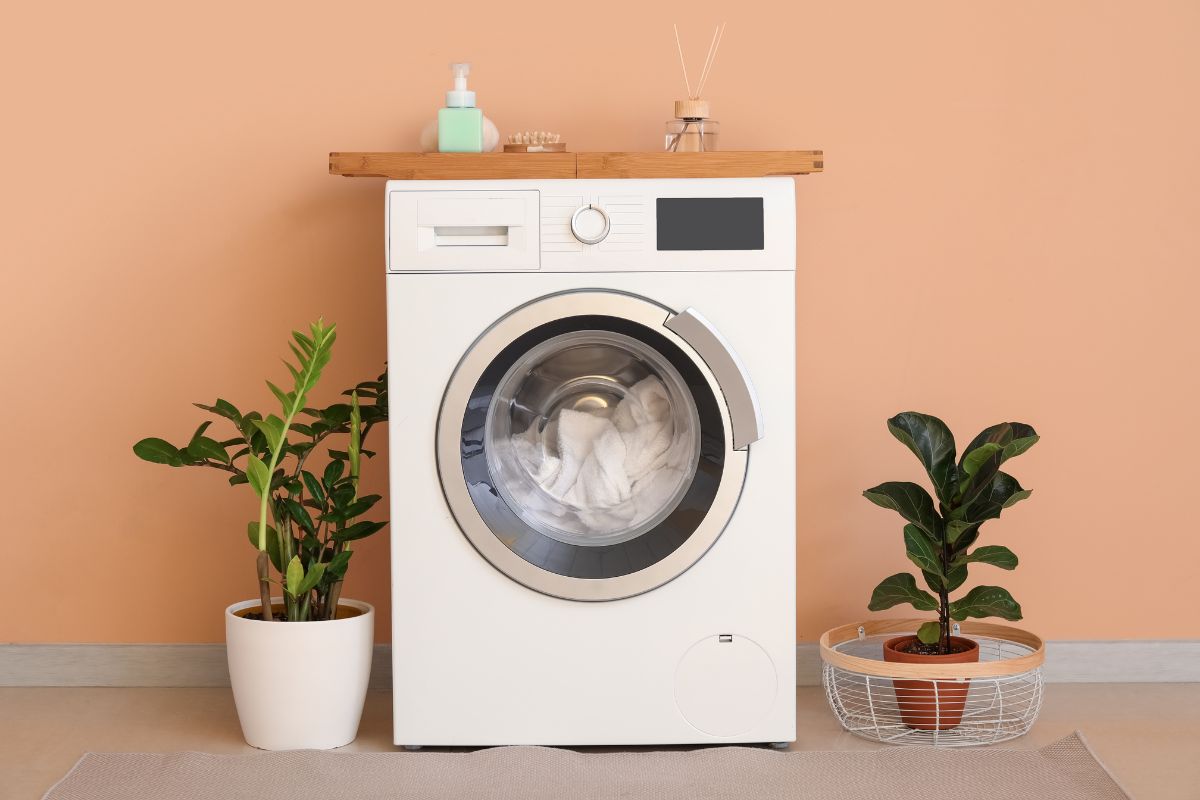Your Cart is Empty
INFO

Sustainable Laundry Routine: Tips for a Greener Clean
January 17, 2023 4 min read
Laundry might seem like a small task, but its environmental impact is significant. From the water it uses to the microplastics it leaves behind, the traditional processes that we use to clean our clothes aren't good for the planet.
The good news is that small changes can have a large impact. In this article, we share our top tips to help you perfect a sustainable laundry routine and reduce your carbon footprint.
1. Invest in a Green Washing Machine
Washing machines are an essential in most homes, helping us to speed up the otherwise labour-intensive process of washing our clothes and textiles. For a washing machine kept for 10 years, an estimated 80% of its carbon emissions are produced when it’s manufactured and delivered. This means you should ensure that your current machine can’t be repaired or given a new lease of life before you replace it.
If it is time for a new machine, invest in a second-hand or “greener” machine to help reduce the environmental impact. Keep in mind that the average lifespan of washing machines has gone down in recent years, with cheaper models only lasting a few years.
The good news is that the latest washing machines can use up to 50% less water and 30% less electricity than older models and, according to The American Cleaning Institute, High-Efficiency Machines (HE) use from 20 to 66% less water and 20 to 50% less energy than traditional agitator washing machines. As well as long-term cost savings for consumers, these machines have significant long-term benefits for the planet.

If possible, you should go for a model that is A-rated and has a lower kWh figure.
2. Buy Sustainable Laundry Detergent
Conventional laundry detergents and fabric softeners can contain harsh chemicals, phosphates, fragrances and dyes that have a negative impact on the environment. The chemicals in fabric softener can also leave a residue on clothes, making them less absorbent and breathable.
Instead, invest in detergents that are made with natural ingredients, and are biodegradable or refillable. Alternatively, you can use soap nuts - otherwise known as soap berries - to clean your clothes. The product you use will be kinder to the environment and better for your clothes.
Got a stain? Several household items can be turned into natural stain removers. The Spruce writes that, depending on the type of stain, baking soda, lime and lemon juice, and distilled white vinegar all make great stain removers. You can work it in with a gentle pot or dish brush.

3. Do a Cold Water Wash
The majority of the energy used to wash your clothes is for heating up the water. By switching to a cold water wash, you can cut right down on your energy consumption, reducing your household costs and your environmental impact. In fact, research by Colorado State University states that washing in cold water reduces your personal carbon footprint by 10%, and most detergents are formulated for a cold wash.
Despite common misconceptions, cold water washing is just as effective as warm water at cleaning clothes. In fact, cold water helps preserve the colour and shape of your clothes better than warm water, and is less likely to cause your clothes to shrink or get damaged.
4. Wash Full Loads
This one might seem obvious, but wait until you have a full load of clothes before you do a wash. This will save water and cut down on consumption, because you’re putting on less frequent washes.
On the same note, consider re-wearing clothes that are worn but not dirty — if you nipped to the shops in a t-shirt, it’s likely it won’t need to be washed before you wear it again. A steamer or lint roller can also give your clothes a new lease of life before you wash again.
5. Air Dry or Use Dryer Balls
Machine drying clothes accounts for 75% of laundry’s total carbon footprint, whereas air-drying your clothes can help reduce climate impact by 67%. Instead of using plastic pegs on your line, invest in bamboo clothes pegs instead — these are biodegradable, and made from the world's fastest-growing plant, making them the most sustainable option.

In the event that you have to use your dryer, wool dryer balls can reduce drying time by promoting better air circulation and increasing the rate at which moisture is evaporated.
Our final bit of advice is to upcycle, donate or sell clothes that you no longer wear, instead of throwing them out. This will help prevent more unnecessary waste ending up in landfill, and give otherwise unused textiles a new lease of life.
Got more tips on how to green your clean? Comment below to share yours.
—
Wild & Stone's mission is to create stylish, easy to adopt and usable alternatives to common plastic products around the home. We source all our products sustainably, from raw material to final delivery. Shop our home & lifestyle products on our website.
Share your plastic-free swaps with us at hello@wildandstone.com or tag us on Instagram #wildandstone.
Also in Sustainable Living Blog

How to Clean a Nail Scrub Brush
January 28, 2026 4 min read
Learn how to care for, deep-clean and disinfect your nail brush so it keeps your nails clean for longer.

What Makes Cotton Organic? And Why It’s Sustainable
January 15, 2026 4 min read
Explore how organic cotton helps nature, farmers and the environment, plus the certifications to look out for.

How to Wash Tea Towels Properly: A Step-by-Step Guide
December 17, 2025 5 min read
Wash your tea towels properly with our step-by-step guide, from how often to wash to the best methods.
Make your inbox a little more eco!
Sign up and save 10% on your first order of 2 items or more.
Keep an eye on your inbox for the latest eco trends, articles, deals and product releases.


